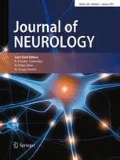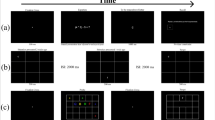Abstract
Patients consistently report cognitive impairment during migraine attacks, yet the documentation of such dysfunction by neuropsychological evaluation has lacked similar consistency. This incongruence may be due to discrepant study designs, assessment tools and small samples sizes. To search for evidence of decline in cognitive functions during a migraine attack, compared to headache-free performance. The secondary objective was to determine if the eventual decline had a consistent neuropsychological pattern. Systematic review of the medical literature using PubMed and Cochrane library databases without limitations or restrictions from inception to March 2014, using the search terms “migraine”, “cognition”, “neuropsychological”. We included studies in episodic migraine that had a neuropsychological evaluation performed during an attack. From 1,023 titles screened, a total of 10 articles met criteria for inclusion and were fully reviewed. Only five of these studies, comprising a total of 163 individuals, had enough data to allow an appraisal of the study question. All five studies were positive in documenting some type of reversible cognitive impairment during the migraine attack. The pattern of cognitive impairment most often documented was of executive dysfunction, but the presence of bias induced by the choice of tests and of small samples prevents this finding from being conclusive. This review supports the existence of reversible cognitive dysfunction during the migraine attack, corroborating patients’ subjective descriptions. Further work is needed to establish the pattern of cognitive dysfunction, their underling pathophysiological mechanisms and the impact of these symptoms in migraine-associated disability.

Similar content being viewed by others
References
Spencer W (1971) De Medicina. Celsus. Harvard University Press, Cambridge
Liveing E (1873) On Megrim and sick-headache and some allied disorders: a contribution to the pathology of nerve storms. Churchill, London
Houtveen JH, Sorbi MJ (2013) Prodromal functioning of migraine patients relative to their interictal state–an ecological momentary assessment study. PLoS One 8:e72827
Giffin NJ, Ruggiero L, Lipton RB et al (2003) Premonitory symptoms in migraine: an electronic diary study. Neurology 60:935–940
Kelman L (2004) The premonitory symptoms (prodrome): a tertiary care study of 893 migraineurs. Headache 44:865–872
Quintela E, Castillo J, Muñoz P, Pascual J (2006) Premonitory and resolution symptoms in migraine: a prospective study in 100 unselected patients. Cephalalgia 26:1051–1060
Schoonman GG, Evers DJ, Terwindt GM, van Dijk JG, Ferrari MD (2006) The prevalence of premonitory symptoms in migraine: a questionnaire study in 461 patients. Cephalalgia 26:1209–1213
Waelkens J (1985) Warning symptoms in migraine: characteristics and therapeutic implications. Cephalalgia 5:223–228
Caro G, Caro JJ, O’Brien JA, Anton S, Jackson J (1998) Migraine therapy: development and testing of a patient preference questionnaire. Headache 38:602–607
El Hasnaoui A, Vray M, Richard A, Nachit-Ouinekh F, Boureau F, MIGSEV Group (2003) Assessing the severity of migraine: development of the MIGSEV scale. Headache 43:628–635
Stewart WF, Lipton RB, Simon D, Von Korff M, Liberman J (1998) Reliability of an illness severity measure for headache in a population sample of migraine sufferers. Cephalalgia 18:44–51
Lipton RB, Kolodner K, Bigal ME et al (2009) Validity and reliability of the migraine-treatment optimization questionnaire. Cephalalgia 29:751–759
Gil-Gouveia R, Oliveira AG, Martins IP (2011) A subjective cognitive impairment scale for migraine attacks. The MIG-SCOG: development and validation. Cephalalgia 31:984–991
Sprenger T, Borsook D (2012) Migraine changes the brain: neuroimaging makes its mark. Curr Opin Neurol 25:252–262
Swartz RH, Kern RZ (2004) Migraine is associated with magnetic resonance imaging white matter abnormalities: a meta-analysis. Arch Neurol 61:1366–1368
Suhr JA, Seng EK (2012) Neuropsychological functioning in migraine: clinical and research implications. Cephalalgia 32:39–54
Rist PM, Kang JH, Buring JE, Glymour MM, Grodstein F, Kurth T (2012) Migraine and cognitive decline among women: prospective cohort study. BMJ 345:e5027
Black L, Horn G, Miller D, Logue P, Durham N (1997) Migraine headache disorder and cognitive abilities. Headache A301–A302
Farmer K, Cady R, Bleiberg J, Reeves D (2000) A pilot study to measure cognitive efficiency during migraine. Headache 40:657–661
Farmer K, Cady R, Springfield M, Reeves D, Bleiberg J (1999) Cognitive Efficiency during Migraine. Neurology 52(Suppl 2):A469–A470
Edwards KR, Rosenthal BL, Farmer KU, Cady RK, Browning R (2013) Evaluation of sumatriptan-naproxen in the treatment of acute migraine: a placebo-controlled, double-blind, cross-over study assessing cognitive function. Headache 53:656–664
Farmer K, Cady R, Bleiberg J et al (2001) Sumatriptan nasal spray and cognitive function during migraine: results of an open-label study. Headache 41:377–384
Mazzucchi A, Sinforiani E, Zinelli P et al (1988) Interhemispheric attentional functioning in classic migraine subjects during paroxysmal and interparoxysmal phases. Headache 28:488–493
Koppen H, Palm-Meinders I, Kruit M et al (2011) The impact of a migraine attack and its after-effects on perceptual organization, attention, and working memory. Cephalalgia 31:1419–1427
Mulder EJ, Linssen WH, Passchier J, Orlebeke JF, de Geus EJ (1999) Interictal and postictal cognitive changes in migraine. Cephalalgia 19: 557–565 (discussion 541)
Meyer JS, Thornby J, Crawford K, Rauch GM (2000) Reversible cognitive decline accompanies migraine and cluster headaches. Headache 40:638–646
Kuhajda MC, Thorn BE, Klinger MR, Rubin NJ (2002) The effect of headache pain on attention (encoding) and memory (recognition). Pain 97:213–221
Bell BD, Primeau M, Sweet JJ, Lofland KR (1999) Neuropsychological functioning in migraine headache, non-headache chronic pain, and mild traumatic brain injury patients. Arch Clin Neuropsychol 14:389–399
Meyer JS, Thornby J, Crawford K, Rauch GM (2000) Reversible cognitive decline accompanies migraine and cluster headaches. Headache 40:638–646
Mazzucchi A, Parma M (1986) Changes in interhemispheric functional balance in epileptic and migraine patients. Funct Neurol 1:375–378
Farmer K, Cady R, Bleiberg J, Reeves D (2000) A pilot study to measure cognitive efficiency during migraine. Headache 40:657–661
Kelman L (2006) The postdrome of the acute migraine attack. Cephalalgia 26:214–220
Karner E, Nachbauer W, Bodner T, Benke T, Boesch S, Delazer M (2012) Long-term outcome of cognitive functions, emotional behavior, and quality of life in a family with familial hemiplegic migraine. Cogn Behav Neurol 25:85–92
Moriarty O, McGuire BE, Finn DP (2011) The effect of pain on cognitive function: a review of clinical and preclinical research. Prog Neurobiol 93:385–404
Moore DJ, Keogh E, Eccleston C (2013) Headache impairs attentional performance. Pain 154:1840–1845
Chamberlain SR, Sahakian BJ (2006) The neuropsychology of mood disorders. Curr Psychiatry Rep 8:458–463
Austin MP, Mitchell P, Goodwin GM (2001) Cognitive deficits in depression: possible implications for functional neuropathology. Br J Psychiatry 178:200–206
Kececi H, Atakay S (2009) Effects of topiramate on neurophysiological and neuropsychological tests in migraine patients. J Clin Neurosci 16:1588–1591
Robbins SJ, Ehrman RN (2004) The role of attentional bias in substance abuse. Behav Cogn Neurosci Rev 3:243–260
de Jonge M, Tabbers HK (2013) Repeated testing, item selection, and relearning. Exp Psychol 1–7
Steiner TJ, Stovner LJ, Birbeck GL (2013) Migraine: the seventh disabler. J Headache Pain 14:1
Conflicts of interest
The authors have no conflicts of interest regarding this study. This study was not funded. Raquel Gil-Gouveia reports no disclosures. Isabel P. Martins reports no disclosures. António G. Oliveira reports no disclosures.
Ethical standard
The manuscript does not contain unpublished clinical studies or patient data. This manuscript reviews published clinical studies that compile to the required Ethical Guidelines.
Author information
Authors and Affiliations
Corresponding author
Rights and permissions
About this article
Cite this article
Gil-Gouveia, R., Oliveira, A.G. & Martins, I.P. Assessment of cognitive dysfunction during migraine attacks: a systematic review. J Neurol 262, 654–665 (2015). https://doi.org/10.1007/s00415-014-7603-5
Received:
Revised:
Accepted:
Published:
Issue Date:
DOI: https://doi.org/10.1007/s00415-014-7603-5




